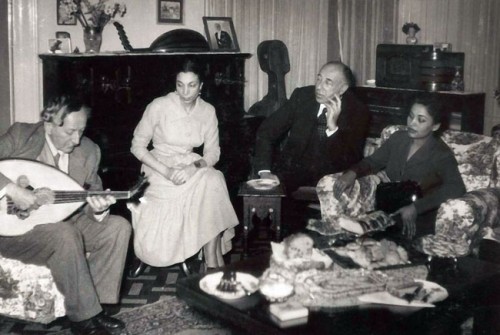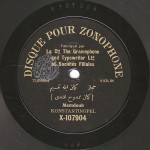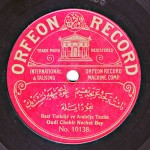The Arab Music Archiving and Research foundation (AMAR), in collaboration with the Sharjah Art Foundation (SAF), presents “Durūb al-Nagham”.
Dear listeners,
Welcome to a new episode of “Durūb al-Nagham”.
Today, we will resume our discussion about the ‘ūd with Mr Mustafa Said.
Turkish Sharīf Muḥyiddīn Ḥaydar, a dilemma himself, is at the origin of the school that focused on technical display and on “caprice”, later known as the Iraqi School –he studied in Iraq for a long time–. Many of his Columbia recordings illustrate this technical display.
He first played the cello, then the ‘ūd, then taught in Iraq where the Modern School of ‘ūd that was followed by many in Iraq and Turkey equally, as well as outside Iraq and Turkey, is attributed to him. The numerous disciples of Sharīf Muḥyiddīn Ḥaydar include notably the brothers Jamīl and Munīr Bashīr, and Salmān Shukr.
Sharīf Muḥyiddīn’s mysterious ‘ūd playing has the same approach as Sayyid Darwīsh in composing. He dealt with both maqām-s and taqsīm-s beautifully.
Let us listen to a taqsīm ‘ushshāq …
(♩)
His interpretation of his own compositions is also beautiful: the samā‘ī ‘ushshāq on side 2 of the taqsīma is powerful and beautiful. Moreover, he abided by the maqām system completely.
Let us listen to the samā‘ī ‘ushshāq.
Alright …
(♩)
Whereas he sometimes uses the ‘ūd as a virtuoso instrument to display technique… the “Yā salām” becomes a “bravo olé”… all these dazzling ornamenting expressions.
Let us listen to an example …
Ok. Let us listen …
(♩)
This western influence in music started in the early 20th century. Some ‘ūdists tried to imitate Sharīf Muḥyiddīn, whether they had listened to him or not, including Riyāḍ al-Sunbāṭī and Farīd Ghuṣn, playing the ‘ūd like a guitar, performing double strokes, etc …
(♩)
Sharīf Muḥyiddīn stands out among his peers in the Levant, in Egypt, and elsewhere as a musician who controlled his high-quality technical skills and was dedicated to his art. So whether he deserved his success or not is a question of opinion…
The point is that he played his ‘ūd in a purely theatrical technical display outside the usual melodic pattern of the maqām system.
Dear listeners, we have reached the end of today’s episode of “Durūb al-Nagham” about the ‘ūd presented with Mr Mustafa Said.
We will resume this discussion in our coming episodes.
Today’s episode was presented by Fadil al-Turki.
“Durūb al-Nagham”.
- 221 – Zakariyya Ahmed – 12 (1/9/2022)
- 220 – Zakariyya Ahmed – 11 (1/9/2022)
- 219 – Zakariyya Ahmed – 10 (11/25/2021)
- 218 – Zakariyya Ahmed – 9 (10/26/2021)
- 217 – Zakariyya Ahmed – 8 (9/24/2021)
- 216 – Zakariyya Ahmed – 7 (9/4/2021)
- 215 – Zakariyya Ahmed – 6 (8/28/2021)
- 214 – Zakariyya Ahmed – 5 (8/6/2021)
- 213 – Zakariyya Ahmed – 4 (6/26/2021)
- 212 – Zakariyya Ahmed – 3 (5/27/2021)
- 211 – Zakariyya Ahmed – 2 (5/1/2021)
- 210 – Zakariyya Ahmed – 1 (4/28/2021)
- 209 – W-al-Lāhi lā astaṭī‘u ṣaddak 2 (4/6/2017)
- 208 – W-al-Lāhi lā astaṭī‘u ṣaddak 1 (3/30/2017)
- 207 – Bashraf qarah baṭāq 7 (3/23/2017)



